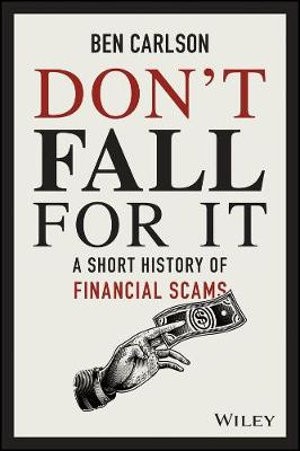
Released back in January was an interesting new book by Ben Carlson. Carlson is a portfolio manager at Ritholtz Wealth Management in the US and also runs the popular financial blog, A Wealth of Common Sense.
The book itself is a handy primer on scams. What are scams really? Psychological manipulations of our weaknesses and vulnerabilities. Losing your hair? Can’t lose weight? Unable to conceive a baby? Need a financial fix? There’s always an unknown cure for whatever ails us. Someone’s always available selling something almost too good to be true.
The victims span the average person to Hollywood and sports stars. No one is immune. We’re all human and can be prone to making a mistake without the right guidance.
The book is also very relevant in a time like this.
People are confused. People are fearful. The comforting response will be a concrete solution. Promising certainty and offering guarantees. That’s the quick way to turn heads and attract a receptive audience. Know someone’s fear? Make your message soothe it with certainty. Scam artists know this. As sharemarkets tumble, it sows the seeds of doubt in investors’ minds. Surely there’s a better way? There will be those offering solutions.
It’s important to be aware that all manner of scams will be flourishing because of the Covid-19 outbreak. In the aftermath, the scams will likely turn toward an investment focus. You’ll never have to suffer a market downturn again. Sounds great. Really it means the risk is more pronounced, just better hidden.
The book spans all manner of scams. Not just financial.
One particularly interesting story revolved around ‘Dr’ John Brinkley. A doctor with a bought qualification who started practising as a physician in 1920’s America. You could virtually anoint yourself a doctor for $100 back then. Brinkley had cornered the market on male infertility by implanting goat testicles in men’s scrotums. Yes, you read that right.
At the time radio was a new and fast-growing information source. Brinkley latched on. It was the medium to get his message out and build his brand. He hosted a medical show from small town Kansas. Patients would write in and Brinkley would diagnose and prescribe over the air. He had deals with pharmacies all over the US. Patients were referred to those pharmacies for their prescriptions.
As Carlson said of Brinkley “No self-respecting doctor would hand out prescriptions without first examining the patient and making a diagnosis, but Brinkley wasn’t trying to appeal to reason: he was trying to appeal to people’s worst fears.”
Something to consider. Plenty of experts dispensing wholesale financial and investment in the media right now. How does any of it relate to our own personal goals?
Another chapter touched on investment newsletter salesmen. All terrible in their forecasting. All exceptional with their insane predictions. During the 1974 bear market, one proclaimed the end was nigh. System collapse upon us. Violence would burst onto the streets.
Over the next 12 months the Dow Jones went up 66%.
Something to consider if you’re pondering your next move. This chapter is also particularly relevant right now. Soon enough the media will start quoting and giving airtime to people who “predicted this”. We noticed David Stockman being mentioned in a column this week in The Australian. (behind paywall). The column proclaimed Stockman predicted the currently calamity. Only last year he suggested a 40% fall in stocks was coming. What wasn’t mentioned was his record. He’d been saying almost the same thing every year for the past decade.
It only took ten years, a global pandemic and an oil price war for him to be right. Not exactly the Nostradamus the columnist would have you believe. Remember, the media will be lining up to put such people in lights. What won’t be in lights is their batting average.
While all the stories of the scams and scammers are entertaining and unbelievable, it’s the last chapter that provides the most value. Long term it could serve as a regular reference point for the reader. Then something to slide under the nose of friends and family. It spells out the six signs to spotting a financial fraud. For someone confronted by any investment they’re unsure of, it could be used as six simple questions they need to ask themselves long before any money transacts. One of those questions comes back with an unsatisfactory answer? A red flag.
The good thing about Carlson’s book, beyond being an easy read and a relevant reference manual on scams? It’s short. The physical version is only 170 pages. A keen reader could get through it in three hours.





